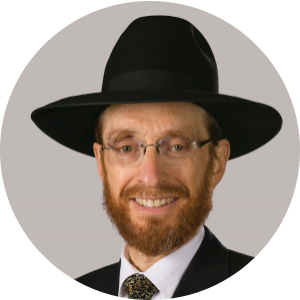Glimpses of Greatness


S o there I was in Lakewood on Shabbos Parshas Vayeitzei attending a family simchah. On Motzaei Shabbos I realized it was still within the week that the Lakewood Mashgiach HaRav Mattisyahu Salomon shlita was sitting shivah for his wife Rebbetzin Miriam Salomon a”h. Then I dithered about whether or not I should go to be menachem avel.
I have nothing so meaningful to say to the Mashgiach I reasoned to myself. And while there is much I could discuss with him none of it would constitute nichum aveilim. My presence alone therefore will add little to the large crowds surely there to be menachem avel. Finally since he is not feeling so well the Mashgiach may not even be there when I come.
Nevertheless since I was only a short car ride away from the Salomon home the scales in my mind tipped in favor of going.
Sure enough the Mashgiach wasn’t there when I arrived although the crowd of people being menachem the Salomon children was so large that his absence was not immediately apparent. Standing in the back I strained unsuccessfully to hear the hushed conversation. About ten minutes later those sitting in front got up and said “HaMakom.” I joined them and began to exit the large dining room. While facing the door as I was about to leave I heard a hush fall over the crowd. I turned and saw the Mashgiach entering from the far side of the room in a wheelchair. A line soon formed which I joined passing in front of the Mashgiach just to say “HaMakom.” As I was putting on my coat to leave for the second time I heard one of the Salomon sons take a microphone and announce that he had three reminiscences of his mother to share. So I stayed to hear what turned out to be brief but profound glimpses of the greatness of Rebbetzin Salomon a”h.
Shlomo Hamelech declared “Tov laleches el beis eivel mileches el beis mishteh” (Koheles 7:2). Rashi comments that nichum aveilim is preferable because it benefits both the living and the deceased while being m’samei’ach chassan v’kallah benefits only the living. I once heard another explanation that in a beis eivel one is more likely to absorb inspiration for personal growth than in a chasunah hall. Reflecting on that pshat my respect for the chochmah of Shlomo Hamelech was reinforced by the three head-shaking stories I heard that evening.
Before coming to Lakewood the Salomons lived in England. A few weeks before Purim one year a local frum family moved to Switzerland. The Rebbetzin learned that what the children in that family regretted most about moving was that they would miss the shalach manos they were so used to receiving from their British friends. When Purim arrived so did a package of shalach manos mailed to Switzerland by the Rebbetzin who made sure it would be received bo bayom. Included in the package were separate bags for each child with his or her name written on them.
A kallah in town had her engagement broken after the wedding invitations were already mailed which greatly intensified her shame and embarrassment. On the day the chasunah was to have taken place the former kallah received a letter from the Rebbetzin full of encouragement chizuk and words of consolation. The next day the girl’s father came to the Rebbetzin to thank her. He said that his daughter read and reread that letter throughout the day. “I have no doubt ” the father said “that she would not have been able to get through the day yesterday if not for your letter.”
The Rebbetzin was accustomed to setting her Shabbos table each week on Thursday night or on Friday morning at the latest. One year the children noticed that she began setting the Shabbos table on Friday afternoon. After a few weeks they became curious and asked her about the change. This was the explanation she gave:
“Tatty has begun saying a shmuess to some of the yungeleit on Erev Shabbos in the morning. If the talmidim come into our home and see our Shabbos table already laid some of them may go home and want their wives to do the same. And perhaps some of the wives will be unable to manage that. Their husbands may say ‘But Rebbetzin Salomon can do it.’ And then it could interfere with their shalom bayis. So it’s better that I change my schedule in order to avoid that risk.”
I left the Salomon home that evening with a deeper understanding of what it means to be truly sensitive to others’ feelings. And I was also profoundly grateful that I had finally decided to be menachem avel that evening.
Yehi zichrah baruch.
Dr. Meir Wikler is a psychotherapist and family counselor in full-time private practice with offices in Lakewood N.J. and Brooklyn N.Y. He is also a prolific author and widely sought-after public speaker.
Oops! We could not locate your form.













